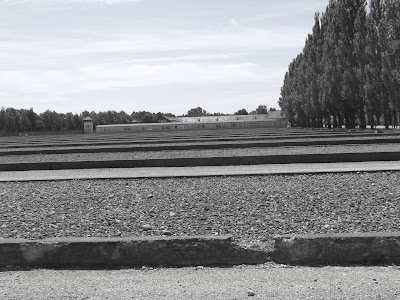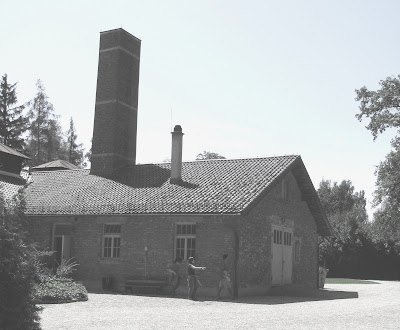 An old cement platform stands beside a set of abruptly ending train tracks. I can almost hear choked-back sobs and murmured whispers as hundreds of prisoners are unloaded like cargo and directed through an imposing gatehouse that heralds the entry into Konzentrationslager Dachau or KZ-Dachau, Nazi Germany's first concentration camp. Alongside the silent vibrations of thousands of invisible footsteps, I voluntarily walk through a gate that, wrought in iron, reads: Arbeit Macht Frei - Work will make you free. One-by-one, my feet fall upon hardened ground and cold cement foundations, taking a sobering step back into a dark history. Yet despite the emptiness within the walls of Dachau Concentration Camp, there is a triumphant echo that carries over its bleakness.
An old cement platform stands beside a set of abruptly ending train tracks. I can almost hear choked-back sobs and murmured whispers as hundreds of prisoners are unloaded like cargo and directed through an imposing gatehouse that heralds the entry into Konzentrationslager Dachau or KZ-Dachau, Nazi Germany's first concentration camp. Alongside the silent vibrations of thousands of invisible footsteps, I voluntarily walk through a gate that, wrought in iron, reads: Arbeit Macht Frei - Work will make you free. One-by-one, my feet fall upon hardened ground and cold cement foundations, taking a sobering step back into a dark history. Yet despite the emptiness within the walls of Dachau Concentration Camp, there is a triumphant echo that carries over its bleakness. As I tread, I wonder whose paths my footsteps trace? I listen to records reported by Dachau survivors - men of flesh and blood - who really faced starvation, beatings, being forced to labor despite illness or pain, or made to act as human guinea pigs in horrendous medical experiments. Voices gravely with age do not disguise the aching rawness of long-borne memories.
As I tread, I wonder whose paths my footsteps trace? I listen to records reported by Dachau survivors - men of flesh and blood - who really faced starvation, beatings, being forced to labor despite illness or pain, or made to act as human guinea pigs in horrendous medical experiments. Voices gravely with age do not disguise the aching rawness of long-borne memories. Inside walls of brick and barbed-wire, I crane my neck to view one of many guardhouses and cringe as I note the openings where a gun barrel would rest - conveniently pointing to the prison yard. I stand on the same square where roll-call was held. The sun is shining brightly and I feel its hot rays upon my back; I shiver as I imagine icy winds and cold, pelting rains penetrating tattered coats and ragged shirts. I peer through a barred opening in a thick wooden door closing off one of many small cells where prisoners where held for interrogation and discipline. I flinch at the thought of punishment extracted on a commanding officer's whims.
Inside walls of brick and barbed-wire, I crane my neck to view one of many guardhouses and cringe as I note the openings where a gun barrel would rest - conveniently pointing to the prison yard. I stand on the same square where roll-call was held. The sun is shining brightly and I feel its hot rays upon my back; I shiver as I imagine icy winds and cold, pelting rains penetrating tattered coats and ragged shirts. I peer through a barred opening in a thick wooden door closing off one of many small cells where prisoners where held for interrogation and discipline. I flinch at the thought of punishment extracted on a commanding officer's whims.


My feet are planted on a cement floor in an open room in the crematorium - Barrack "X" - where emaciated prisoners were informed they would take showers. I see the ovens where the stank of decaying flesh was reduced to ashes. I pause in front of the firing range where bullets, not sickness or despair, ended a life.


I head back to the gatehouse and reflect upon the intensity of each moment I have experienced. I pause as my eyes take a final sweep across the yard, and I wish I could somehow show, in a verifiable way, what I feel inside; words and pictures emote a stark fraction. Maybe I can't elucidate it all, but I can try.
 And I freely pass through the iron gate once again as I leave.
And I freely pass through the iron gate once again as I leave.
1 comment:
Wow, that was a great narrative. Visiting the concentration camps is always a sobering experience. Thank you for sharing your visit with me!
Post a Comment